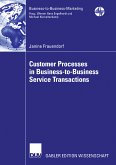Some scholars propose that the concept of market orientation needs to be extended to encompass a company's indirect customers too. In an action-oriented perspective, this extended market orientation implies the notion of multi-stage marketing (MSM). For B-to-B settings, MSM entails the expanded consideration of both direct and indirect customers; it also provides the necessary capabilities to implement such a market orientation. In this study, Alejandro-Marcel Schönhoff presents a scenario-based experiment, using limit conjoint analysis, to establish an empirical basis for measuring the potential effects of different MSM types on direct customers' willingness-to-pay and other key outcome variables. The results show, among other things, that collaborative MSM exerts a positive effect on willingness-to-pay, whereas non-collaborative MSM has a negative effect on direct customers' satisfaction and loyalty. Furthermore, the relevance of MSM depends on the direct customers' market power toward their own customers.
Contents
- Conceptualization and definition of MSM
- Generic types and instruments of MSM
- Effect mechanisms of MSM
- Implications for marketing research and practice
Target Groups
- Lecturers and students of business administration, specializing in marketing
- Marketing, sales, and general managers working in B-to-Bmarkets
The Author
Alejandro-Marcel Schönhoff is a sales manager in the industrial adhesives division of a consumer and industrial goods manufacturer in Düsseldorf, Germany.
Dieser Download kann aus rechtlichen Gründen nur mit Rechnungsadresse in A, B, BG, CY, CZ, D, DK, EW, E, FIN, F, GR, HR, H, IRL, I, LT, L, LR, M, NL, PL, P, R, S, SLO, SK ausgeliefert werden.









